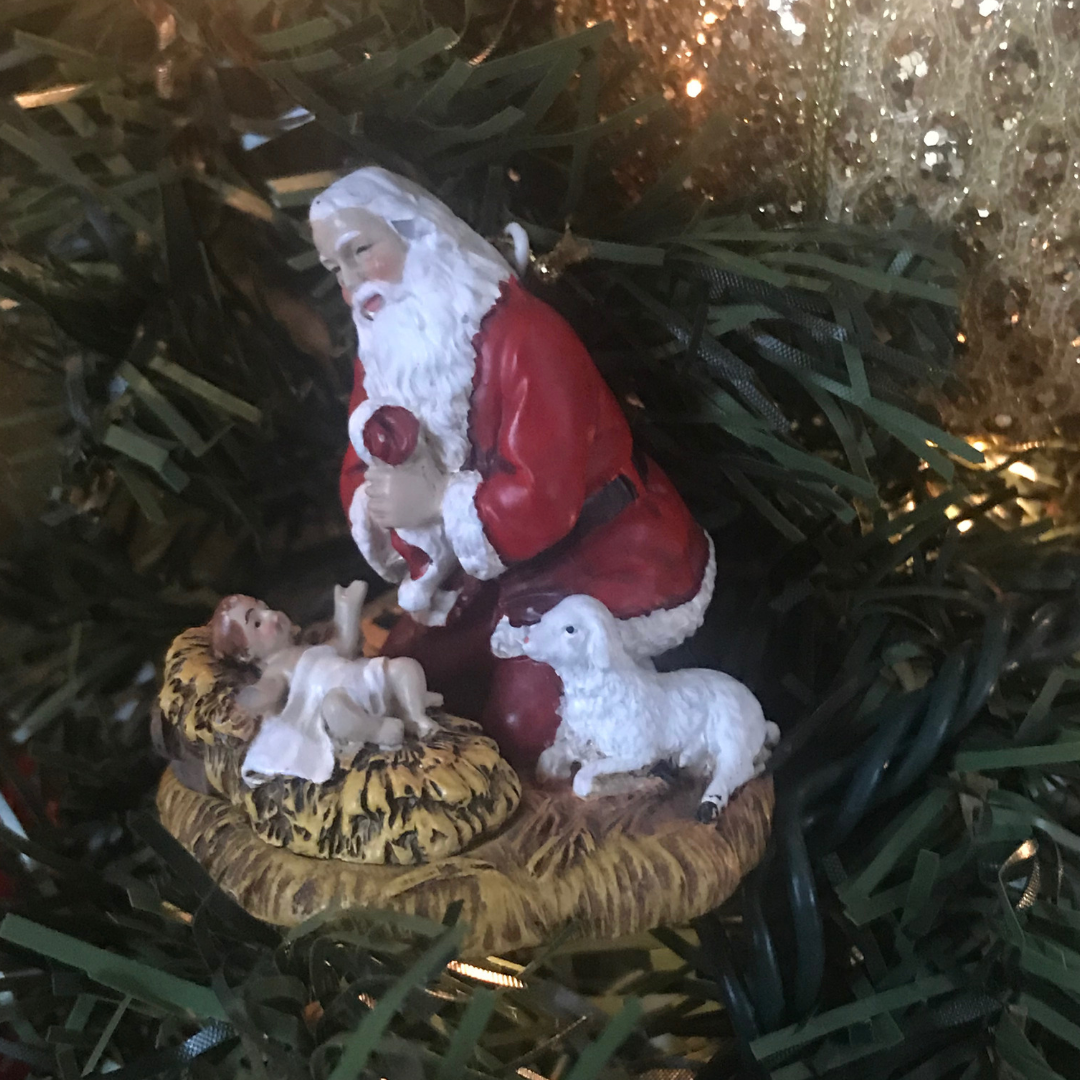Some of your kids will come and ask you, “Is Santa real?” They will want you to say, “Yes, absolutely, of course” and, most especially, “Look at all the gifts he brought.” But is there a better option for those questions your kids ask sooner than you wish they had? And if you are past that particular parenting moment, this article also applies to the tough teenage questions as well.
One of my favorite ornaments is a Santa kneeling by the manger. That is a truthful perspective on our Christmas celebrations. When my kids were little, we enjoyed celebrating Santa at Christmas. But, when my kids grew older and had their doubts, they asked me if Santa was real. I told them the truth about Saint Nicholas and how his true story has been changed to include flying reindeer and a sleigh. The truth didn’t take away from the fun of Christmas and it made it much easier to separate the truth of Christmas from the celebration of the holiday.
Sometimes it’s important to consider the way children process words. Mr. Rogers (Fred Rogers) had multiple edits for his scripts because he understood that kids hear things differently. When a child hears the word story, they think of something typically fictional. Yet, everyone calls Luke 2 the Christmas story. We won’t be able to change that, but we can change the way our children understand those words.
If you want to separate the Christmas story from the story of Santa, you can use something as simple as that ornament. Google the truth about St. Nicholas and talk about why someone based the story of Santa Claus on his life. You can read the familiar “’Twas the Night Before Christmas” poem. Then grab your Bible and read Luke 2. Talk about both “stories,” and then ask your kids to tell you the difference between them. Even the little ones can understand if a “story” comes from the Bible, it is always true. Every child’s life would be blessed by that knowledge.
My kids were young when they learned the truth about Santa, and it didn’t make our Christmas celebrations less fun. It was important to me that my kids understood that, when they asked me a question, I would always tell them the truth. Kids need to be able to trust their parents. It’s a little more work to answer with age-appropriate truth, but you might as well develop an honest relationship with them from the beginning.
Okay . . . several of you might have just thought, Too late. It’s not. All you need to do is say, “I wish I had thought of this earlier because I would have said . . . .” Or, “If I had it to do over again, I would . . . .” Kids love knowing their parents aren’t perfect. Some of the best lessons with our kids begin with, “I wish I had” and end with something like, “I will try to get it right next time.” It’s all good. We aren’t supposed to be perfect, even in our kids’ eyes. Perfection isn’t the truth either!
How does all of this apply to your tweens and teens? Hopefully, they don’t think Santa is coming down their chimney or the Easter bunny is leaving them chocolate. When you think about it, those thoughts are really kind of creepy! Your kids are going to ask you why the youth pastor says they aren’t supposed to have sex before marriage. Your kids will ask you why they can’t go to a movie their friends are seeing. And they will ask you why you believe Jesus rose from the dead. At least, I hope your kids will ask you. There is a better chance they will ask if they know you are going to tell them the whole truth. There is a better chance they will believe you (even if they don’t want to) if you always have been truthful. So, the earlier the better—but now works too!
Maybe it would help to stop using phrases like “the Easter story” or “the story of David and Goliath.”. I use those words all the time when I teach. The last thing I want to do is cause a child to think of those stories as fiction. Maybe we can try to remember to include the words “from the Bible.” If our kids understand that every story from the Bible is truth, cover to cover, we have handed them one of the most important lessons for their entire lives.
It’s still early in the Christmas season, but it is better to be prepared to give an answer before you get asked the question. Paul told Timothy, “Do your best to present yourself to God as one approved, a worker who has no need to be ashamed, rightly handling the word of truth” (2 Timothy 2:15). I love that Paul said, “Do your best.” Parenting is about keeping the big picture in mind while doing your best with those day-to-day moments.
Paul also told Timothy, “All Scripture is breathed out by God and profitable for teaching, for reproof, for correction, and for training in righteousness, that the man of God may be competent, equipped for every good work” (2 Timothy 3:16–17). I love that Paul said believers would be competent. Competency is a lot easier standard to achieve than perfection.
Enjoy your kids and your Christmas. You are ready for the tough questions because you know that God has already supplied you with his best answers. When your kids figure that out, they have made a significant step forward in their spiritual lives. Keep teaching them the truth. One day, they will thank you for respecting their ability to handle it.



